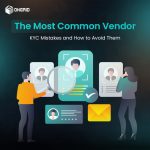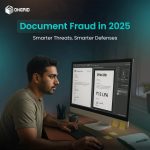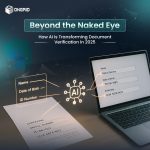Table of Contents
Toggle
Education verification is a critical aspect of maintaining the credibility of academic qualifications in India. With the rapid growth of the job market and educational institutions, ensuring that individuals possess genuine academic qualifications has become a pressing issue. Whether it’s for employers hiring new staff, colleges accepting students, or for government bodies making policy decisions, the authenticity of educational credentials is key. As a result, education verification has become more vital than ever to ensure integrity, trust, and the fair distribution of opportunities. This blog delves deep into the role and importance of education verification in India, shedding light on the challenges, solutions, and its significance.
Read also: Education Verification Simplified
The Growing Need for Education Verification
India, home to one of the largest youth populations globally, has witnessed a significant surge in higher education enrollment over the past few decades. The nation is also experiencing a shift toward a competitive job market, with employers requiring specialized skills and academic qualifications to identify suitable candidates. In this context, the need to validate educational credentials has become paramount.
In the past, education verification was often seen as a secondary concern, but now it has emerged as a crucial process that determines whether a person is genuinely qualified for a job, a higher education program, or any position of trust. Institutions, government agencies, and businesses have increasingly recognized that the stakes are high when it comes to authenticating educational backgrounds.
The Risks of Fake Degrees

The prevalence of fake degrees and falsified qualifications has been one of the primary reasons for the surge in education verification efforts in India. According to various reports, a considerable number of individuals have resorted to fraudulent means to acquire degrees, diplomas, and certificates that are not earned through legitimate academic programs.
Several factors contribute to this rise in fake credentials:
Lack of stringent regulations: In the absence of robust checks and monitoring systems, some individuals have exploited loopholes to obtain counterfeit degrees. These forged qualifications may be from unaccredited institutions or even completely fabricated.
Rising competition: The increasing demand for highly skilled and educated individuals often leads some people to seek shortcuts. They may turn to fraudulent means to keep up with the demand for qualifications in the professional world.
Inadequate verification systems: In some cases, employers or institutions do not have the proper systems or infrastructure to verify academic credentials thoroughly. This creates a breeding ground for forged documents to slip through the cracks.
Fake degrees carry several risks and consequences for the broader society:
Erosion of trust: Fake degrees undermine the credibility of institutions and employers who have invested in genuine education and skill-building. When fraudulent qualifications are discovered, it damages the reputation of educational institutions and companies alike.
Safety risks: In fields like healthcare, engineering, and law, individuals with fake degrees can pose a significant danger. For example, hiring a doctor with a counterfeit medical degree can put patients’ lives at risk.
Economic impact: When fake qualifications are allowed to infiltrate industries, it leads to the hiring of underqualified individuals, which can ultimately hurt economic progress and hinder innovation.
The Role of Education Verification
Education verification ensures that an individual’s academic credentials are valid, accurate, and obtained from a legitimate source. The process of verification involves contacting the educational institution or authority that issued the degree to confirm its authenticity. This process is vital in various situations:
1. For Employers
Employers across industries are increasingly relying on education verification to ensure that the candidates they hire are genuinely qualified for the job. With the rise of the gig economy and freelance work, it’s not uncommon for applicants to claim qualifications from prestigious institutions or obscure programs that don’t exist.
By conducting education verification, employers can:
Minimize hiring risks: Verifying educational credentials helps employers avoid hiring individuals with fake qualifications, which could lead to significant reputational damage, legal liabilities, or safety concerns in certain sectors.
Ensure a fair recruitment process: Verification ensures that every candidate’s qualifications are thoroughly examined, creating a level playing field for all applicants.
Increase employee trust: Candidates who know that their qualifications are being verified are more likely to trust the hiring organization. This transparency in the recruitment process fosters mutual respect.
2. For Educational Institutions
Educational institutions also rely on verification processes when admitting students. The rise in cross-border admissions, especially to universities abroad, has necessitated a more formalized process for verifying previous academic qualifications.
The role of education verification for institutions includes:
Ensuring academic integrity: By verifying the qualifications of applicants, universities and colleges help maintain a high standard of education and uphold their reputation for producing skilled professionals.
Preventing fraudulent applications: Education verification helps prevent students from entering academic programs based on fake credentials. It ensures that only individuals with genuine academic backgrounds are accepted.
Enhancing student quality: By weeding out applicants who attempt to enter based on falsified qualifications, institutions can maintain a higher level of academic rigor and create an environment that attracts motivated, well-prepared students.
3. For Government and Regulatory Bodies
Government agencies and regulatory bodies must also prioritize education verification to preserve the integrity of national education policies and to prevent the spread of fake qualifications within the workforce. Verification processes for public sector roles and government programs help ensure that candidates meet the requisite educational standards.
Education verification in this context ensures:
Fairness in public sector hiring: In a democracy, it is essential that the hiring processes for public sector roles are transparent and based on merit. Verification helps prevent individuals from entering public services based on fraudulent qualifications.
Regulatory compliance: Government bodies can implement policies that require verification of educational qualifications to ensure all citizens are given a fair chance to access government services and employment opportunities.
Upholding national security: In sectors like defense, law enforcement, and intelligence, hiring unqualified personnel due to fake degrees can pose a national security risk. Education verification in these areas helps to maintain safety and protect the public.
The Process of Education Verification
The process of education verification generally involves several key steps:
Document Review: Initially, the applicant provides copies of their academic certificates, mark sheets, and other relevant documents. These documents are then reviewed for completeness and authenticity.
Contacting Educational Institutions: A primary step in verification is contacting the educational institution that issued the degree or diploma. This may involve sending requests to universities, colleges, or specialized educational authorities.
Cross-Referencing with National Databases: In some cases, institutions are registered in national or state databases that can be cross-referenced to verify if the applicant’s credentials are valid.
Third-Party Verification Services: Many organizations and employers in India turn to third-party agencies that specialize in education verification. These services have the infrastructure, expertise, and resources to conduct thorough checks on academic credentials.
Final Report: Once verification is complete, the employer or institution receives a report detailing the results, which can either confirm the authenticity of the documents or indicate discrepancies.
Conclusion: Building a Culture of Authenticity
As the demand for qualified professionals increases, so does the importance of education verification. For India, ensuring that educational qualifications are genuine is essential to maintaining the integrity of its workforce, education system, and societal structures. By prioritizing verification processes, employers, educational institutions, and government agencies can help reduce fraud, ensure fair practices, and protect public safety.
Moreover, as the world becomes more interconnected, countries like India must adopt transparent and rigorous systems of verification to foster trust in their institutions, both domestically and globally. With more stringent education verification protocols in place, India can further establish itself as a country that values authenticity, fairness, and excellence in its education system.
The responsibility to ensure authenticity lies not only with the educational institutions but also with employers and government bodies that collectively play an important role in safeguarding the credibility of the nation’s workforce. Education verification is not just a precaution but a necessary step toward building a society that values integrity, skill, and hard-earned qualifications.





Leave a Reply